Digital marketing tools are essential to businesses, marketers, and agencies who want to increase their internet visibility, customer engagement, and conversion of customers. Digital marketing tools help in SEO, social media management, content creation, email marketing, analysis, and advertising. By using the right digital marketing tools, business organizations can optimize campaigns, track performance, and automate repetitive tasks to save time and resources.
This list of top 15 digital marketing tools was selected based on key factors such as functionality, usability, price, scalability, and support for integration. These tools are appropriate for a wide audience of digital marketers, content creators, e-commerce stores, and agencies. For SEO, paid advertising, social media, or content marketing, these tools guarantee data-driven marketing success.
Criteria for Selecting Ideal Digital Marketing Tools
- Functions: The tool must include core features which can include SEO optimization together with content creation email marketing social media management and analytics based on specific purposes.
- User-friendly: The tool offers easy usability through its straightforward interface and user-friendly design which allows marketers, businesses and agencies to employ it without formal training.
- Integration: Stationary integration should exist between the software system and other marketing tools alongside CRM tools as well as analysis platforms to enhance workflow.
- Artificial Intelligence: AI capabilities with intelligent automation help to achieve efficiency improvements and enhanced campaign optimization together with personalization.
- Affordability: The solution needs to offer dynamic price plans at rates suitable for small operations along with startups and big businesses.
- Scalability: The system needs to scale up when business expansion requires more data processing together with enhanced marketing campaigns or interaction management features.
- Performance: The business requirements involve a system that operates swiftly without delays to support fluid real-time management of campaigns and analysis processing.
- Customisation: Specific marketing requirements require the capacity to customize workflows as well as dashboards and reports.
- Support: The system provides extensive customer support and documentation combined with community forums, which help users feel more satisfied while learning how to solve encountered problems.
- Security and Compliance: The application needs to fulfill industry regulations and standards, including GDPR and CCPA, to ensure protected data security and privacy.
Comparison Between Best Digital Marketing Tools
Here’s a comparison table of the best digital marketing tools, covering features, pricing, use cases, and official websites:
| Tool | Key Features | Pricing | Best For | Website |
| Google Analytics | Website traffic analysis, user behavior tracking, goal conversion tracking | Free & Paid (GA 360) | Marketers, web analysts, e-commerce businesses | analytics.google.com |
| SEMrush | SEO audit, keyword research, PPC analysis, content marketing | Starts at $139.95/month | SEO professionals, digital marketers, content creators | semrush.com |
| Ahrefs | Backlink analysis, keyword tracking, competitor research | Starts at $129/month | SEO specialists, bloggers, agencies | ahrefs.com |
| Moz Pro | SEO keyword tracking, domain authority analysis, site audits | Starts at $49/month | Small businesses, SEO professionals | moz.com |
| HubSpot Marketing Hub | Email marketing, CRM, automation, landing pages | Free & Paid (from $890/mo Includes 3 seats) | Enterprises, inbound marketers, sales teams | hubspot.com |
| Hootsuite | Social media scheduling, analytics, team collaboration | Starts at ₹1,915per month/mo | Social media managers, brands, agencies | hootsuite.com |
| Buffer | Social media scheduling, engagement tracking, analytics | Starts at $5/month | Small businesses, solopreneurs, marketers | buffer.com |
| Canva | Graphic design, templates, social media visuals | Free & Paid (from ₹500/month/user ) | Content creators, marketers, small businesses | canva.com |
| Mailchimp | Email marketing, automation, audience segmentation | Free & Paid (from ₹575 for 12 months) | Small businesses, e-commerce, bloggers | mailchimp.com |
| ActiveCampaign | Email automation, CRM, customer segmentation | Starts at $15/month | Mid-sized businesses, agencies, sales teams | activecampaign.com |
| Google Ads | PPC advertising, keyword targeting, conversion tracking | Pay-per-click model | Businesses of all sizes running paid campaigns | ads.google.com |
| Facebook Business Manager | Facebook & Instagram ad management, audience insights | Pay-per-click model | Social media advertisers, agencies, e-commerce | business.facebook.com |
| Sprout Social | Social media analytics, engagement, collaboration | Starts at $249/month | Large businesses, social media teams | sproutsocial.com |
| BuzzSumo | Content research, influencer discovery, social sharing insights | Starts at $199/month | Content marketers, bloggers, PR professionals | buzzsumo.com |
| Unbounce | Landing page builder, A/B testing, conversion tracking | Starts at $99/month | Digital marketers, agencies, growth hackers | unbounce.com |
List of 15 Best Digital Marketing Tools
1. Google Analytics
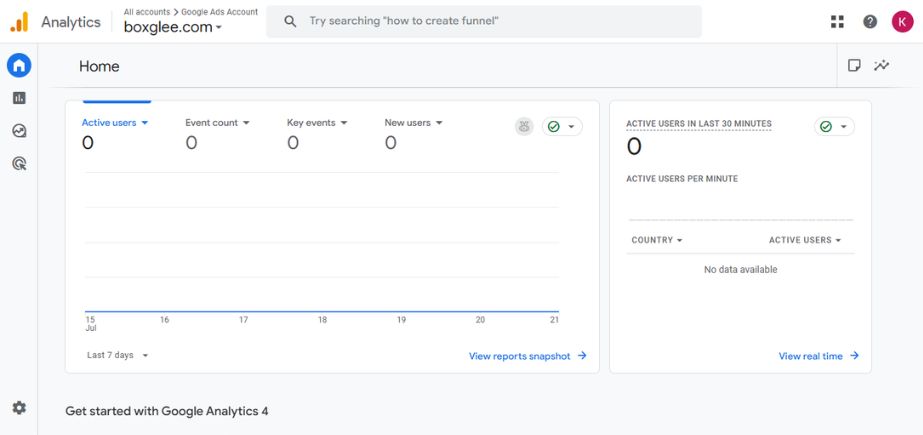
Google Analytics is a leading web measurement application that helps business houses keep an eye on web traffic, user behavior, and conversion. It provides them with information on audience demographics, traffic sources, and engagement statistics and helps marketers enhance their digital approach further. Equipped with real-time reporting, goal tracking, and integration with Google Ads, it is a requirement for business houses if they wish to improve their reach on the Internet. Google Analytics is ideal for website proprietors, digital marketers, and online stores that require making effective decisions to enhance marketing performance and user experience.
Key Features:
- Real-time website traffic analysis
- Audience segmentation and demographics tracking
- Goal and conversion tracking
- Integration with Google Ads and other platforms
Pros:
- Free and widely used by businesses of all sizes
- Provides deep insights into user behavior and traffic sources
Cons:
- Steep learning curve for beginners
- Requires manual setup for advanced tracking
Pricing:
Free (Google Analytics 4), premium version available (Google Analytics 360)
Who Should Use It?
Website owners, marketers, and e-commerce businesses looking to track and optimize website performance.
2. SEMrush
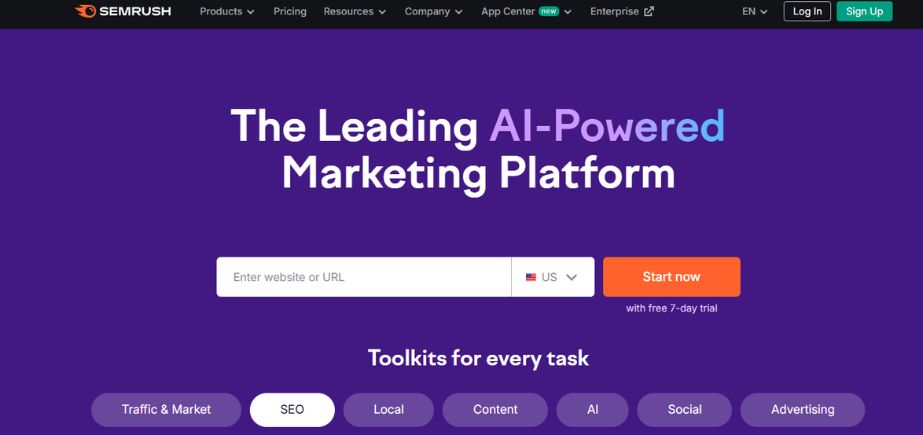
SEMrush is an all-in-one digital marketing tool that offers SEO, PPC, content marketing, and competitive research capabilities. It offers keyword research, backlink monitoring, site audit, and ad insights to allow businesses to improve their search ranking and web presence. SEMrush also offers social media management and market trend monitoring. Marketers, SEO specialists, and content creators use SEMrush to stay ahead of the competition by optimizing their websites, tracking competitors, and executing data-informed campaigns for improved organic and paid search performance.
Key Features:
- Keyword research and SEO audit
- Backlink analysis and link-building tools
- PPC campaign tracking and optimization
- Competitive research and domain analytics
Pros:
- Comprehensive data for SEO and paid search campaigns
- User-friendly interface with in-depth insights
Cons:
- Expensive for small businesses
- Some data may be outdated compared to real-time tools
Pricing:
Starts at $139.95/month
Who Should Use It?
SEO professionals, digital marketers, and businesses running paid search campaigns.
3. Ahrefs
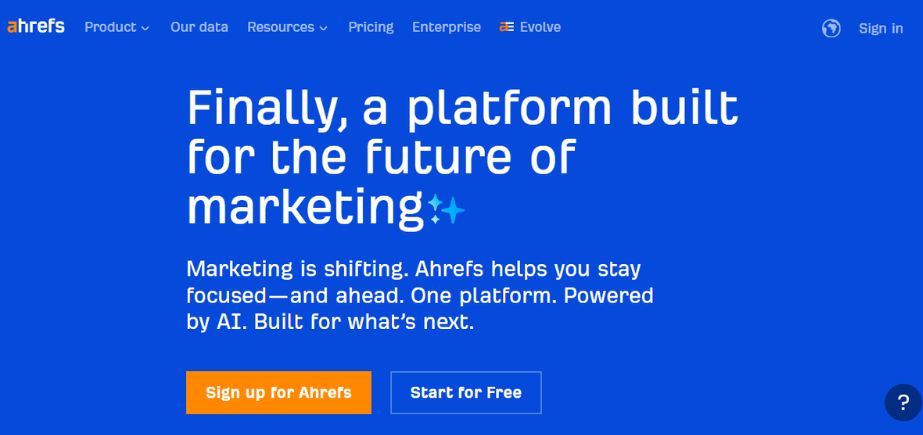
Ahrefs is a robust SEO tool widely praised for its complete backlink research, keyword report, and web auditing features. It provides rich search traffic, competitor rank tracking, and content opportunity data. Ahrefs’ Site Explorer allows marketers to examine any website’s backlinks and allows companies to make informed decisions on how to optimize the link-building method. By using Content Explorer and Rank Tracker, marketers can identify existing trends and chart their SEO trends. It is used heavily by web marketers, content managers, and SEO experts to improve their websites and increase search engine ranking.
Key Features:
- Backlink analysis with a massive link index
- Keyword research for search engines
- Rank tracking for SEO performance
- Site audit for technical SEO issues
Pros:
- One of the best tools for backlink analysis
- Comprehensive keyword research and competitor insights
Cons:
- No built-in PPC features
- Expensive for beginners and small businesses
Pricing:
Starts at $129/month
Who Should Use It?
SEO professionals, content marketers, and digital agencies focusing on organic search growth.
4. Moz Pro
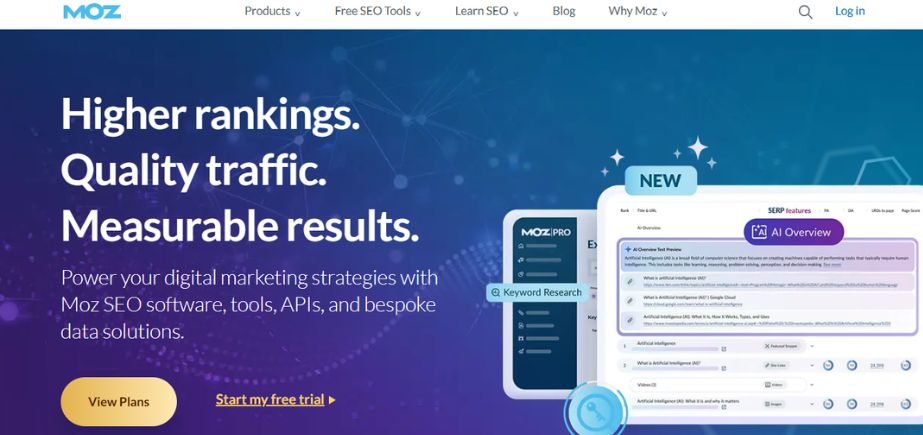
Moz Pro is a full-featured SEO suite that supports businesses with keyword research, website audits, backlink analysis, and rank monitoring. It provides features like Moz Keyword Explorer, which helps users pick the most optimal keywords to optimize for and Moz Link Explorer, which analyzes backlink profiles. Moz Pro Page Optimization tool offers actionable recommendations on how to boost on-page SEO. Ideal for SEO professionals, digital marketers, and businesses requiring to boost their organic traffic, Moz Pro simplifies search engine optimization with easy-to-use reporting and data-driven intelligence.
Key Features:
- Keyword explorer for ranking insights
- Site audit for technical SEO issues
- Backlink analysis and tracking
- SEO toolbar for on-page optimization
Pros:
- Accurate keyword difficulty scores
- Easy-to-use interface with actionable recommendations
Cons:
- Limited PPC features
- Can be expensive for smaller teams
Pricing:
Starts at $49/month
Who Should Use It?
SEO professionals, businesses, and content marketers aiming to improve search rankings.
5. HubSpot Marketing Hub
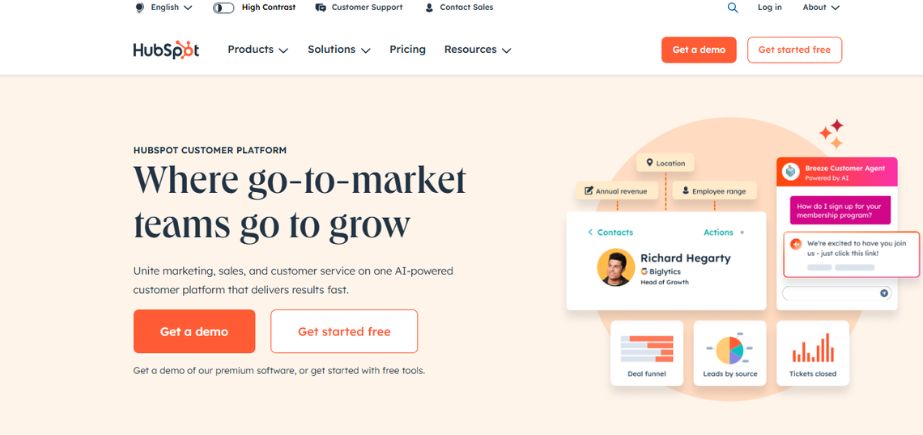
HubSpot Marketing Hub is a suite of inbound marketing software that’s made for businesses to attract, engage, and convert leads. It has applications for email marketing, content publishing, SEO optimization, social media management, and lead nurturing. It can also integrate with CRM tools so businesses can customize interactions with customers. HubSpot has automation, analytics, and A/B testing for marketers to efficiently run campaigns and increase conversions. It’s a great option for companies large and small, especially B2B marketers and sales forces wanting to boost their online marketing activities.
Key Features:
- Email marketing automation
- Lead generation and CRM integration
- Landing page and form builders
- SEO and content strategy tools
Pros:
- All-in-one marketing automation with a user-friendly interface
- Seamless integration with sales and customer service tools
Cons:
- Expensive for small businesses
- Some advanced features require higher-tier plans
Pricing:
Free & Paid (from $890/mo; Includes 3 seats)
Who Should Use It?
Marketers, sales teams, and businesses looking for a complete inbound marketing solution.
6. Hootsuite
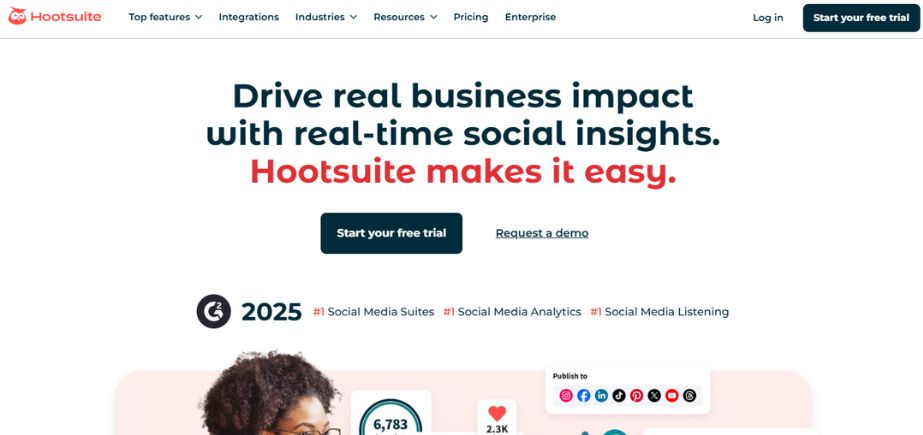
Hootsuite is a social media web tool used by companies to post content, monitor engagement, and track performance on multiple sites. It supports Facebook, Instagram, Twitter, LinkedIn, and more, enabling marketers to stay active across all their social platforms from a single platform. Hootsuite provides analytics reporting, social listening, and teamwork. It is employed by millions of agencies, businesses, and social media administrators to schedule posting content, track brand mentions, and increase audience engagement.
Key Features:
- Social media scheduling and publishing
- Analytics and reporting on social performance
- Team collaboration and approval workflows
- Integration with multiple social networks
Pros:
- Supports multiple social accounts in one dashboard
- Provides detailed engagement analytics
Cons:
- Can be expensive for large teams
- Limited features in the free version
Pricing:
Starts at ₹1,915 per month
Who Should Use It?
Social media managers, businesses, and agencies managing multiple social accounts.
7. Buffer
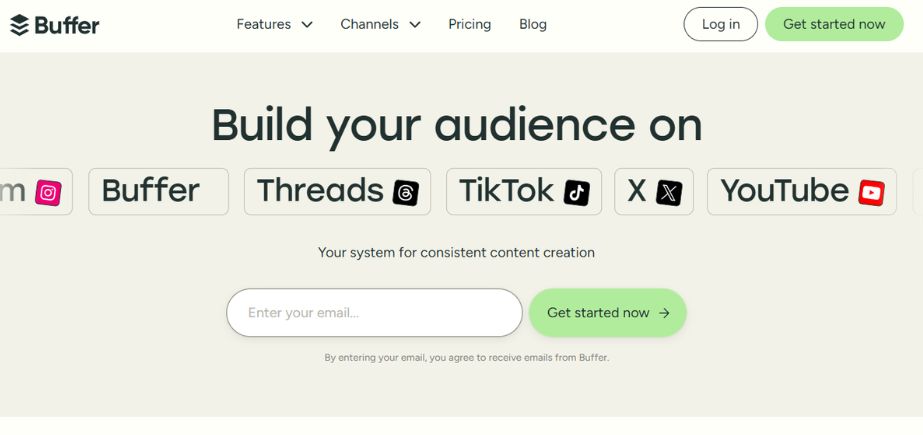
Buffer is a social media content planning and analytics app that allows businesses to plan, post, and measure across a variety of networks. It includes easy-to-use scheduling with features to design a content calendar and schedule posts in advance. Buffer also monitors engagement so businesses can measure the impact of social media. With team management capabilities and ease of use, Buffer makes a great choice for social media marketing experts, bloggers, and small businesses that want to better their social media strategy.
Key Features:
- Post scheduling for multiple social platforms
- Engagement tracking and analytics
- Team collaboration tools
- Customizable posting schedules
Pros:
- Simple and intuitive interface
- Affordable compared to other social media management tools
Cons:
- Limited features in the free version
- No advanced social listening capabilities
Pricing:
Starts at $5/month per channel
Who Should Use It?
Small businesses, social media marketers, and freelancers managing multiple social media accounts.
8. Canva
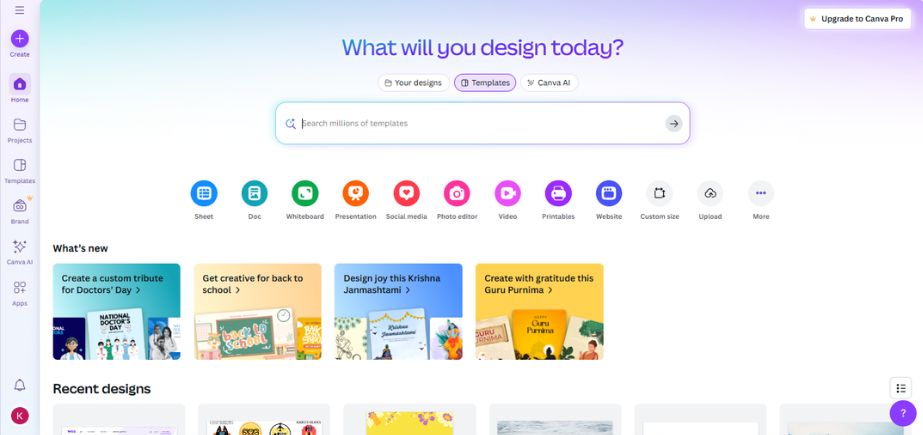
Canva is graphic design software that allows people and businesses to design professional-quality visual materials, ranging from social media posts and presentations to posters and advertising materials. Canva includes a drag-and-drop editor, editable templates, and a huge collection of design resources, which allows anyone who is not a designer to use design. Canva includes brand customization, team collaboration, and digital and print exporting. Canva has now become used extensively by marketers, bloggers, teachers, and small business owners to design content that is visually appealing with little reference to professional design expertise.
Key Features:
- Drag-and-drop design editor
- Extensive template library
- Team collaboration and brand kits
- Integration with stock images and videos
Pros:
- User-friendly, even for non-designers
- Free plan with extensive features
Cons:
- Limited customization compared to professional design tools
- Some premium templates and assets require a paid plan
Pricing:
Free, Pro plan starts from ₹500/month
Who Should Use It?
Marketers, small businesses, and content creators looking for easy graphic design solutions.
9. Mailchimp
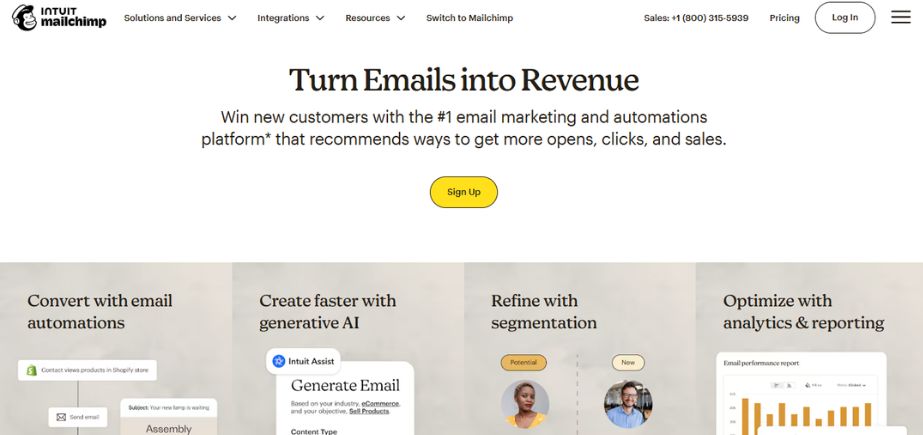
Mailchimp is among the highest-rated email marketing software that helps companies create, automate, and track email campaigns. It has template-able emails, segmentation, A/B split testing, and detailed analytics to get the highest email opening rates. Mailchimp also integrates with shopping websites, thereby making it good business software for customer relationship building and increasing sales through personalized email marketing. It is best positioned for small business people, e-commerce sellers, and marketers requiring a user-friendly platform to facilitate email campaigns.
Key Features:
- Drag-and-drop email builder
- Email automation workflows
- Audience segmentation and A/B testing
- Analytics and reporting
Pros:
- Free plan available for small businesses
- User-friendly email campaign builder
Cons:
- Pricing increases with larger email lists
- Limited automation features in lower-tier plans
Pricing:
Free for up to 500 contacts, paid plans from ₹575 for 12 months
Who Should Use It?
Small businesses, e-commerce brands, and marketers focusing on email campaigns.
10. ActiveCampaign
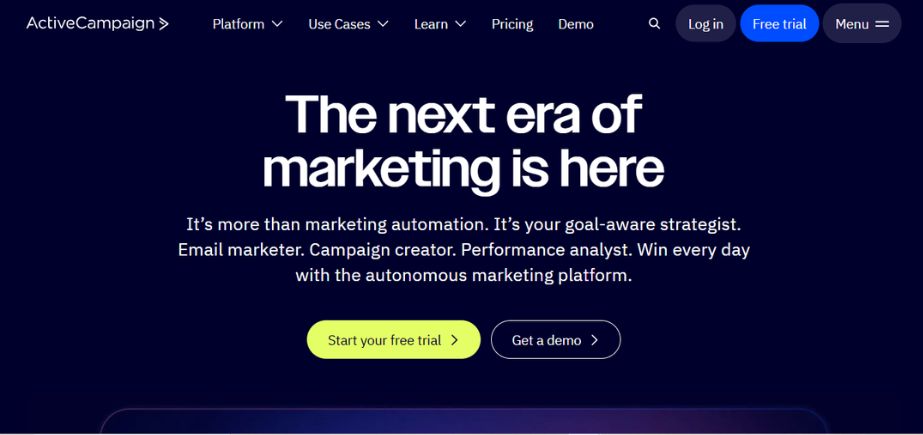
ActiveCampaign is a strong customer relationship management (CRM) and email marketing tool that gives the features of automation, segmentation, and personalization. ActiveCampaign assists companies in creating automated email workflows, tracking customer behaviors, and responding to leads efficiently. With its integration of AI insights and multi-channel marketing, ActiveCampaign is a perfect place for companies that need to reach out to leads and acquire more customers. It is particularly well-suited to support the expanding businesses, web marketers, and sales forces that require enterprise-level email auto-pilot and CRM.
Key Features:
- Email automation and segmentation
- CRM integration for personalized campaigns
- A/B testing and predictive analytics
- Multi-channel marketing automation
Pros:
- Powerful automation and personalization features
- Strong CRM and sales automation tools
Cons:
- Steeper learning curve for beginners
- Can be expensive for smaller businesses
Pricing:
Starts at $15/month
Who Should Use It?
Businesses needing advanced email automation and customer relationship management.
11. Google Ads
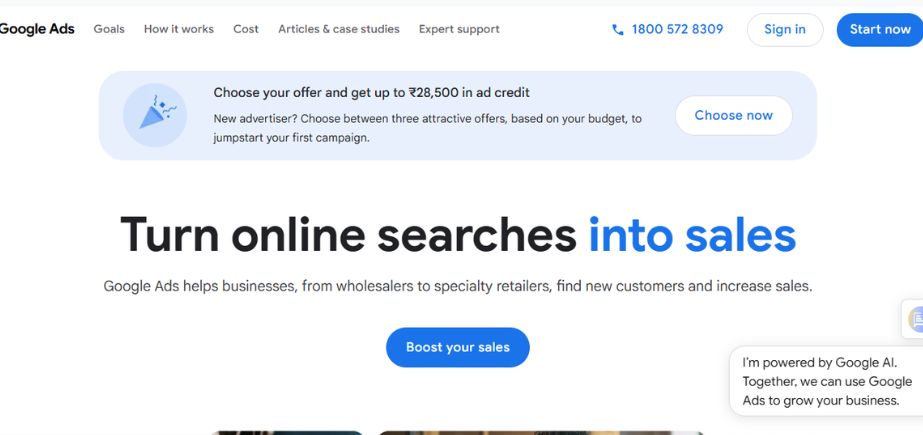
Google Ads is an online advertising program that allows companies to create and manage pay-per-click (PPC) ads on Google Search, YouTube, and other related sites. It provides keyword targeting, audience segmentation, and bid methods to help companies get the best out of their advertising expenditure. Google Ads also provides performance monitoring and conversion maximization tools. It is an essential tool for every company looking to drive targeted traffic, lead generation, and boost sales through paid ads.
Key Features:
- Keyword-based search ads
- Display and video advertising options
- Conversion tracking and analytics
- AI-powered bidding strategies
Pros:
- Large audience reach through Google’s network
- Measurable ROI with detailed campaign tracking
Cons:
- High competition in some industries
- Requires ongoing optimization and budget management
Pricing:
Pay-per-click model, budgets vary based on bidding strategy
Who Should Use It?
Businesses looking to drive traffic and conversions through paid advertising.
12. Facebook Business Manager
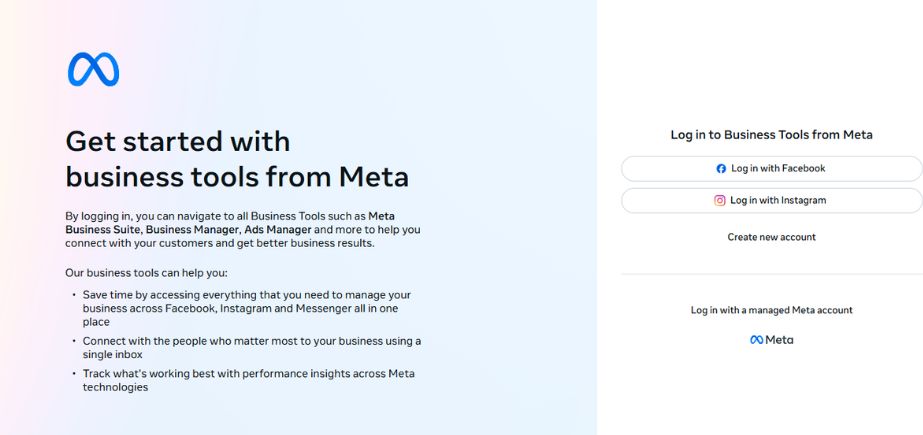
Facebook Business Manager is a system where companies can control Facebook and Instagram ads, pages, and ad campaigns in one central location. It offers targeting different audiences, monitoring advert performance, and budget management options. Companies can produce and handle advertising accounts, work with teams, and integrate into e-commerce websites. It is a fundamental tool for online marketers, social media administrators, and companies depending on Facebook and Instagram advertising to drive brand recognition and customer engagement.
Key Features:
- Ad campaign management for Facebook and Instagram
- Audience targeting and custom audience creation
- A/B testing for ad creatives
- Performance analytics and insights
Pros:
- Detailed audience targeting options
- Integration with e-commerce and CRM tools
Cons:
- Complex interface for beginners
- Requires ongoing budget and strategy adjustments
Pricing: Pay-per-click or impression-based pricing
Who Should Use It?
Businesses and marketers running paid social media campaigns.
13. Sprout Social
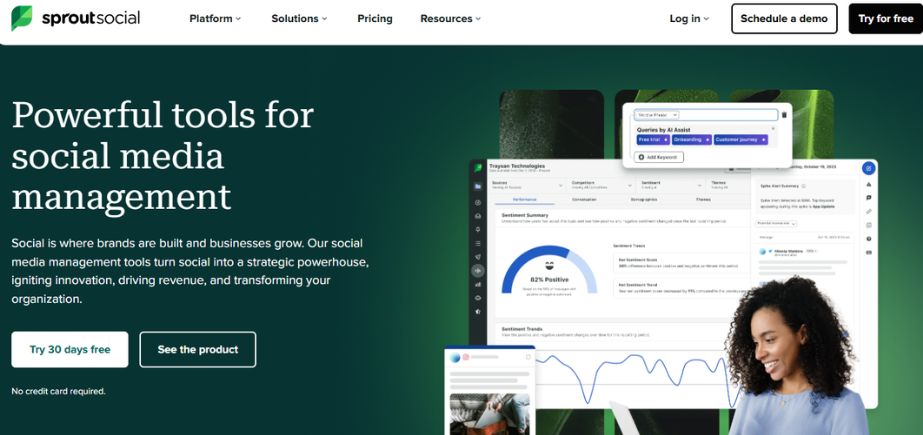
Sprout Social is a social listening and engagement platform that enables businesses to monitor performance, manage customer interaction, and fine-tune social media strategy. It is designed with social listening, content scheduling, and reporting capabilities to analyze engagement on multiple platforms. With collaboration tools and artificial intelligence-driven insights, Sprout Social is perfect for brands, agencies, and social media teams that require an all-in-one solution for social media marketing, customer service, and reputation management.
Key Features:
- Social media publishing and scheduling
- Social listening and sentiment analysis
- Team collaboration and approval workflows
- Performance analytics and reporting
Pros:
- Strong analytics and reporting tools
- Supports multiple social media platforms
Cons:
- Higher pricing than some competitors
- Limited features in basic plans
Pricing:
Starts at $249/month
Who Should Use It?
Large businesses, agencies, and teams managing multiple social media accounts.
14. BuzzSumo
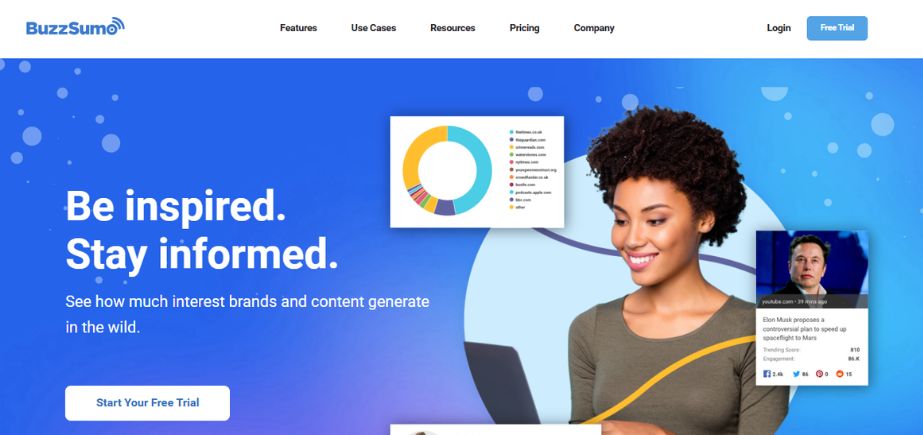
BuzzSumo is an effective content marketing research platform that allows businesses to find trending content, monitor competitors, and find influencers within their niche. It offers insights into the performance of content on social media channels so marketers can create data-backed content strategies that are most likely to be engaged with. With backlink information, content alerts, and trending insights, BuzzSumo empowers its users to track brand mentions, identify trending content, and fine-tune outreach strategies. BuzzSumo is popularly adopted by content marketing, SEO agencies, and internet marketing companies to gain increased exposure, audience response, and branding.
Key Features:
- Content discovery and trend analysis
- Competitor content analysis
- Influencer identification and outreach
- Social media engagement tracking
Pros:
- Great for content marketing research
- Helps identify viral content and influencers
Cons:
- Expensive for small businesses
- Limited free version
Pricing:
Starts at $199/month
Who Should Use It?
Content marketers, bloggers, and businesses looking for content strategy insights.
15. Unbounce
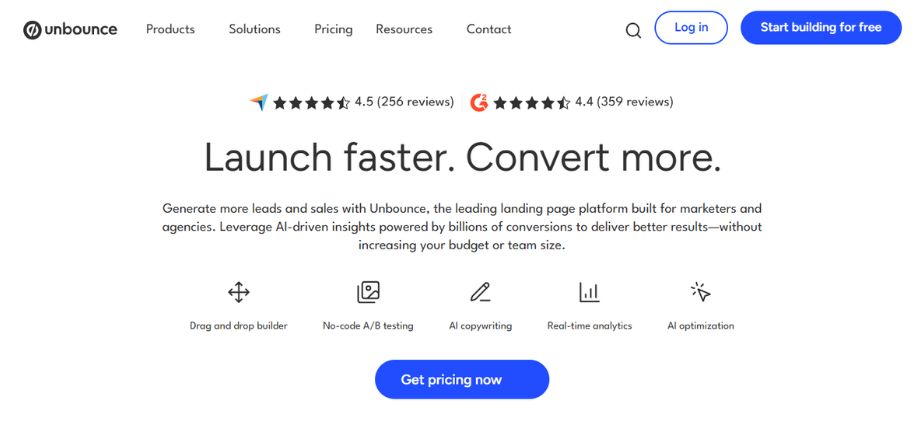
BuzzSumo is a useful content marketing research tool that enables companies to discover trending content, keep an eye on competitors, and identify influencers in their niche. It provides end-to-end insights into the social performance of the content to enable marketers to develop fact-driven content strategies that produce the best engagement. By monitoring backlinks, content alerts, and trending information, BuzzSumo enables users to monitor brand mentions, discover trending content, and automate outreach. It is widely employed by online marketing agencies, SEO experts, and content marketers for audience interaction, brand image, and visibility.
Key Features:
- Drag-and-drop landing page builder
- A/B testing for conversion optimization
- AI-powered Smart Traffic feature
- Integration with marketing automation tools
Pros:
- Easy-to-use interface with customizable templates
- Strong focus on conversion rate optimization
Cons:
- Pricing can be high for small businesses
- Learning curve for advanced features
Pricing:
Starts at $99/month
Who Should Use It?
Marketers, e-commerce businesses, and advertisers looking to improve conversion rates.
Conclusion
Companies need digital marketing software as their essential marketing tool that helps them reach maximum results and improve customer contact while generating higher conversion rates. The SEO-specialized companies should consider SEMrush together with Ahrefs and Moz Pro as the best tools for their work. A key component of digital marketing is using social media analytics tools. Companies can leverage the scheduling and analytics tools at Hootsuite as well as Buffer and Sprout Social for social media management.
The automation features and CRM abilities for email marketing exist within the software of Mailchimp along with ActiveCampaign. The website performance requires Google Analytics but the Google Ads platform combined with Facebook Business Manager assists in paid advertising. Landing pages experience maximum optimization through Unbounce while users can create their content using Canva. The selection of tools depends on businesses’ needs combined with their monetary constraints along with their marketing targets to reach optimal efficiency and return on investment.
FAQs
1. What are digital marketing tools?
Digital marketing tools refer to software that enables businesses to plan, conduct, and report online marketing activity. They perform SEO, manage social media, create content, send email communications, place pay-per-click or pay-for-promotion advertising, and report traffic to drive exposure and engage customer bases.
2. Which digital marketing tool is best for SEO?
SEMrush, Ahrefs, and Moz Pro are some of the top SEO tools, providing keyword research, backlink checking, competitor analysis, and technical SEO audits to enhance search ranking.
3. What is the ideal social media management tool?
Hootsuite, Buffer, and Sprout Social are leading social media management tools that enable users to schedule posts, track engagement, and measure performance on multiple platforms.
4. Are free digital marketing tools effective?
Yes, some free tools such as Google Analytics, Canva (basic version), and Mailchimp (free plan) have useful features, but high-end tools do offer greater functionalities for effective marketing performance.
5. How do I choose the right digital marketing tool for my business?
Think about your business size, budget, marketing objectives, and needed features. Select tools that easily integrate with your current workflow and give measurable outcomes.

